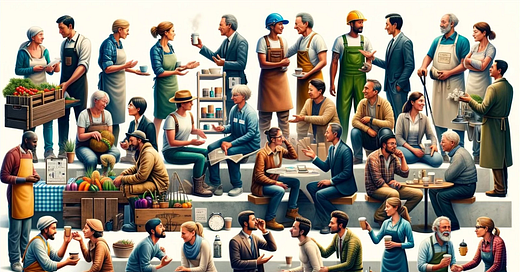They’re people, not customers
Nurturing human connections in a digital world may be the secret to building a supply chain worthy of our times.
This edition continues my quest to bring art, technology, and science together to create a better newsletter, and to inspire supply chain innovations worthy of our times. After writing a complete edition in my usual style, I asked ChatGPT to redo my work in the style of Ernest Hemingway–simple, direct language, with underlying themes implied more than explained. I also added some art created in collaboration with artificial intelligence (AI). Does it work? Let me know. Please.
Everyone has a story
Business today is changing. But not in the way we may think. It's about being human. Think not about selling customers but understanding people. What if we connect genuinely? Truly? What if human intimacy becomes more important than digital transformation?
I thought about this during a conversation about the word “sonder.” It's from John Koenig's “Dictionary of Obscure Sorrows.” He defines it as “the awareness that everyone has a story.” It means understanding that every person is the main character in their life. Koenig says:
You are the main character. The protagonist. The star at the center of your unfolding story. You're surrounded by your supporting cast: friends and family hanging in your immediate orbit. Scatter a little further out, a network of acquaintances who drive in and out of contact over the years.
But there in the background, faint and out of focus, are the extras. The random passersby. Each living in a life as vivid and complex as your own. They carry on invisibly around you, bearing the accumulated weight of their own ambitions, friends, routines, mistakes, worries, triumphs, and inherited craziness.
When your life moves to the next scene, theirs flickers in place, wrapped in a cloud of backstory and inside jokes and characters strung tougher with countless other stories you'll never be able to see. That you'll never know exist. In which you might appear only once. As an extra sipping coffee in the background. As a blur of traffic passing on the highway. As a lighted window at dusk.
Koenig's words mean something in business. They make us think about people, not customers. We should see them, understand them. Empathy matters. We should use empathy not just for sales. Use it to understand customer dreams. Nurture human relationships. Think beyond market share.
Here's more, inspired by sonder:
Distributors are not the center of the supply chain. No member of the supply chain is. Customers are. Make them vivid. Revel in complexity. Dig into aspirations, companions, habits, errors, concerns, victories, and genetic madness.
Co-creation is important. It's about working with customers, not persuading them. Look for a shared purpose. Build on that. Be a partner. Create mutual profits. Think big. Is what you do good for the community where you exist with your customers? For society? The economy?
Storytelling is revolutionary. Don't think of messages, value propositions, campaigns, updates, or announcements. Share real stories—about the people behind the best outcomes. Let customers help. Anyone involved. Experiences are your products.
Don't map the journey if doing so tempts you to manage it. Wander purposefully. Create a space for flourishing. Be the supporting cast. Travel from scene to scene, helping the customer realize goals. Note the emotions created. Add them to your metrics.
Sustainability and ethics are essential, but only achieved through trust. Share. Be vulnerable. Put your data out there. Ask for help in knowing what to do with it. Do the right thing, not the most effective or least costly thing.
Radical collaboration
Business is about empathy, co-creation, purpose, storytelling, experience, community, sustainability, ethics, and trust. Use them, but don't let them be jargon. Use the words offered by customers. Build a supply chain worthy of our times.
What can you do? How can we work together? I'm open to ideas. And arguments. Can we achieve something radical? Or get stuff done? Share your thoughts. Or reach out at mark.dancer@n4bi.com.





